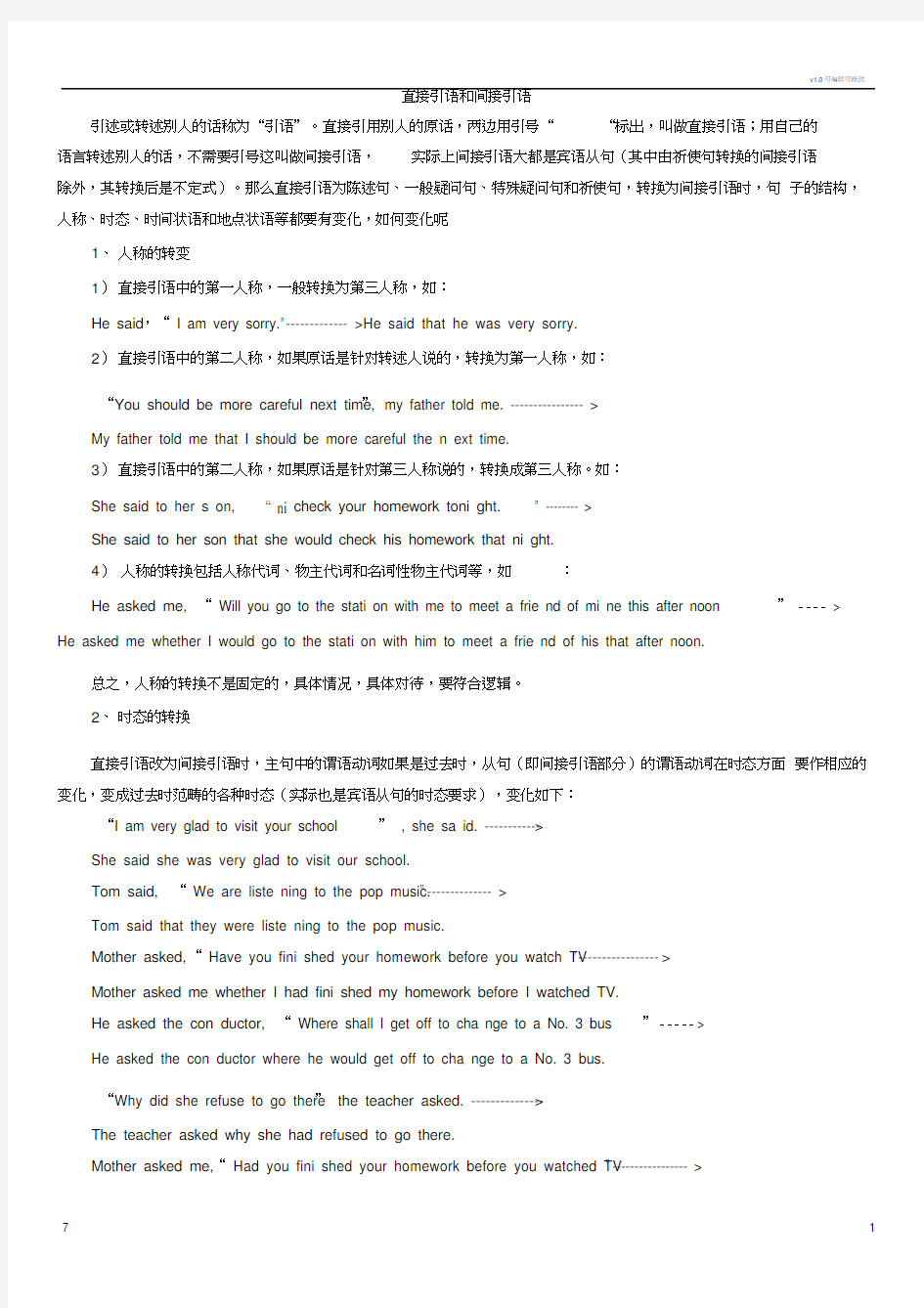直接引语和间接引语知识点归纳

- 1、下载文档前请自行甄别文档内容的完整性,平台不提供额外的编辑、内容补充、找答案等附加服务。
- 2、"仅部分预览"的文档,不可在线预览部分如存在完整性等问题,可反馈申请退款(可完整预览的文档不适用该条件!)。
- 3、如文档侵犯您的权益,请联系客服反馈,我们会尽快为您处理(人工客服工作时间:9:00-18:30)。
直接引语和间接引语
引述或转述别人的话称为“引语”。直接引用别人的原话,两边用引号““标出,叫做直接引语;用自己的
语言转述别人的话,不需要引号这叫做间接引语,实际上间接引语大都是宾语从句(其中由祈使句转换的间接引语
除外,其转换后是不定式)。那么直接引语为陈述句、一般疑问句、特殊疑问句和祈使句,转换为间接引语时,句子的结构,人称、时态、时间状语和地点状语等都要有变化,如何变化呢
1、人称的转变
1)直接引语中的第一人称,一般转换为第三人称,如:
He said,“ I am very sorry. ”------------- >He said that he was very sorry.
2)直接引语中的第二人称,如果原话是针对转述人说的,转换为第一人称,如:
“You should be more careful next time, ” my father told me. ---------------- >
My father told me that I should be more careful the n ext time.
3)直接引语中的第二人称,如果原话是针对第三人称说的,转换成第三人称。如:
She said to her s on, “ ni check your homework toni ght. ” -------- >
She said to her son that she would check his homework that ni ght.
4)人称的转换包括人称代词、物主代词和名词性物主代词等,如:
He asked me, “ Will you go to the stati on with me to meet a frie nd of mi ne this after noon ”---- > He asked me whether I would go to the stati on with him to meet a frie nd of his that after noon.
总之,人称的转换不是固定的,具体情况,具体对待,要符合逻辑。
2、时态的转换
直接引语改为间接引语时,主句中的谓语动词如果是过去时,从句(即间接引语部分)的谓语动词在时态方面要作相应的变化,变成过去时范畴的各种时态(实际也是宾语从句的时态要求),变化如下:
“I am very glad to visit your school ” , she sa id. ------------ >
She said she was very glad to visit our school.
Tom said, “ We are liste ning to the pop music. ”-------------- >
Tom said that they were liste ning to the pop music.
Mother asked, “ Have you fini shed your homework before you watch TV ”----------------- >
Mother asked me whether I had fini shed my homework before I watched TV.
He asked the con ductor, “ Where shall I get off to cha nge to a No. 3 bus ”----- >
He asked the con ductor where he would get off to cha nge to a No. 3 bus.
“Why did she refuse to go there ” the teacher asked. --------------- >
The teacher asked why she had refused to go there.
Mother asked me, “ Had you fini shed your homework before you watched TV ”----------------- >
Mother asked me whether I had fini shed my homework before I watched TV.
Tom said, “ We were havi ng a football match this time yesterday. ” ---- >
Tom said that they were having a football match that time the day before.
He said,“ I have n't heard from my pare nts these days. ” --- >
He said that he had n't heard from his parents those days.
3、直接引语变成间接引语时,从句时态无须改变的情况
1)当主句的谓语动词是一般现在时的时候,如:
He always says, “ I am tired out. ” -------------- >He always says that he is tired out.
2)当主句的谓语动词是将来时的时候,如:
He will say, “ I ' II try my best to help you. ” 一>He will say that he will try his best to help
me.
3)当直接引语部分带有具体的过去时间状语时,如:
He said, “ I went to college in 1994. ”--- >He told us that he went to college in 1994.
4)当直接引语中有以whe n, while 引导的从句,表示过去的时间时,如:
He said,“When I was a child, I usually played football after school. ”---- >
He said that whe n he was a child, he usually played football after school.
5)当直接引语是客观真理或自然现象时,如:
Our teacher said to us, "Light travels faster tha n sound. ”---- >
Our teacher told us that light travels faster tha n sound.
6)当引语是谚语、格言时,如:
He said,“ Practice makes perfect. ”-------------- >He said that practice makes perfect.
7)当直接引语中有情态动词should, would, could, had better, would rather, might, must, ought to, used to, n eed 时,如:
The doctor said, “ You'd better drink ple nty of water. ” --- >
The doctor said I'd better drink plenty of water.
He said, “ She must be a teacher. ”--------- > He said that she must be a teacher.
He said, “ She ought to have arrived her office by now. ” --- >
He said that she ought to have arrived her office by the n.
The teacher said, “ You n eed n't hand in your compositi ons today. ”--- >
The teacher said we n eed n' t/did n't n eed to/did n't have to hand in our compositi ons.
She asked, “ Must I take the medici ne ”------------ > She asked if she had to take the medic ine.
〔注〕:此处用had to代替must更好
